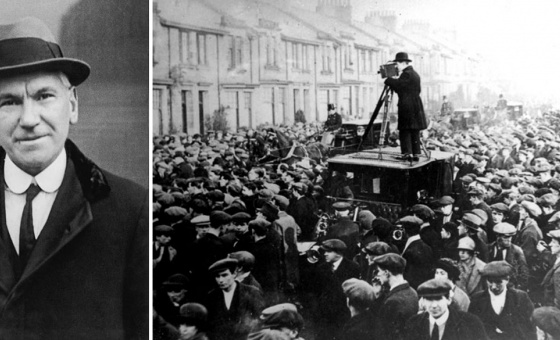This is the last article you can read this month
You can read more article this month
You can read more articles this month
Sorry your limit is up for this month
Reset on:
Please help support the Morning Star by subscribing here
LAST FRIDAY on April Fool’s Day every household faced the first rise in fuel bills from the private-sector utilities companies that have so much control over our lives. And this is just the start.
The day before that turned out to be a sick joke for civil and public servants too, as the government published the Treasury Pay Remit, forcing public-sector employers to limit pay rises for government staff to 2 per cent. Whilst Scottish government workers’ pay sits outside the pay remit, it is normal for devolved governments of all political shades to merely put a tartan cover over the British remit.
By the second day of April, trade unionists and community campaigners in 25 towns and cities came together under the banner of the People’s Assembly to protest over the cost-of-living crisis.
Only days before that, the Public and Commercial Services Union (PCS) national consultative ballot on pay, pensions and the cost of living saw over 70,000 government workers vote for the demand of a 10 per cent pay rise and express willingness to take industrial action.
Now that the Treasury has shown its contempt for its own workforce, the PCS calculates that the average PCS member (on a salary of £23,000) will lose out by at least £2,811 a year.
The cost-of-living assault comes through not only the government’s measly 2 per cent pay offer, but also hikes in energy prices, as well as the increase in National Insurance contributions, council tax rises and the spiralling cost of food.
For many, this is an annual cost-of-living increase of at least £3,271.20 when you look at average monthly increases for food bills (with spring inflation at 8 per cent), energy bills (up 54 per cent) and rises in council tax.
Then there’s fuel increases, monthly mortgage and rent repayments, National Insurance contributions and water rates up.
With these frightening figures replicated across the public sector and low-paid private-sector workers alike, let’s turn away from anguish and angst and let’s get angry — really angry — this April as we build the fightback against the biggest assault on the cost of living since records began.
Let us turn the attention on income inequality and the super-rich. The People’s Assembly informs us that while the average worker does not have £100 in savings, the richest 5 per cent have at least £3.6 million in assets. Taxing these billionaires with a wealth tax is long overdue.
We could also be like France and cap energy prices. And of course, increase wages and benefits in line with inflation. Why should workers pay?
The TUC has named the day for the mass protest in London as June 18. The new deal for working people demo is a real opportunity for all of us to come together in strength. Let’s all make sure we build for this as the biggest trade union mobilisation in decades.
But we all need to do so much more to beat the Tories than walk through the streets of London.
Town hall meetings across the country are part of the TUC’s strategy to build for the big demo. We need to come together locally as well as nationally to build, to organise and to transport our people to London for the big day. And then build, grow and win for workers fighting back against Tory austerity — all year round.
Those of us in the trade union movement have a responsibility to build the fightback industrially and unite with communities in saying that we won’t pay for the crisis. To do that we need to rebuild confidence in the power of collective fightback. Who’s in?
Lynn Henderson is senior national officer for the PCS union.












